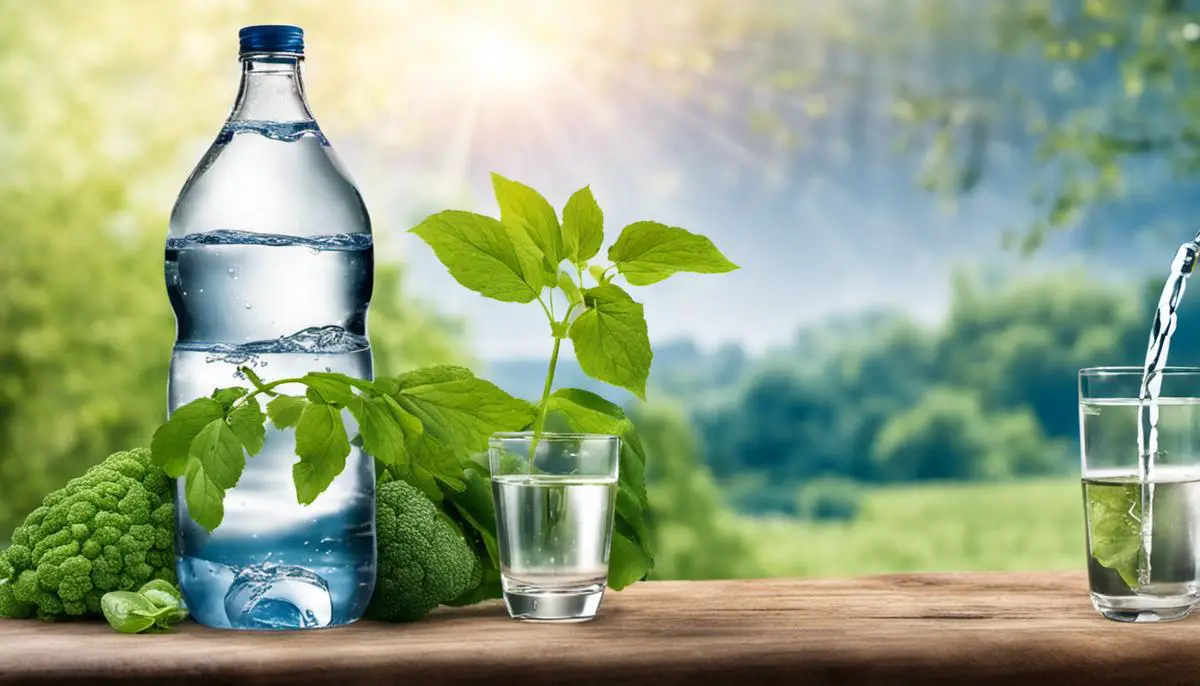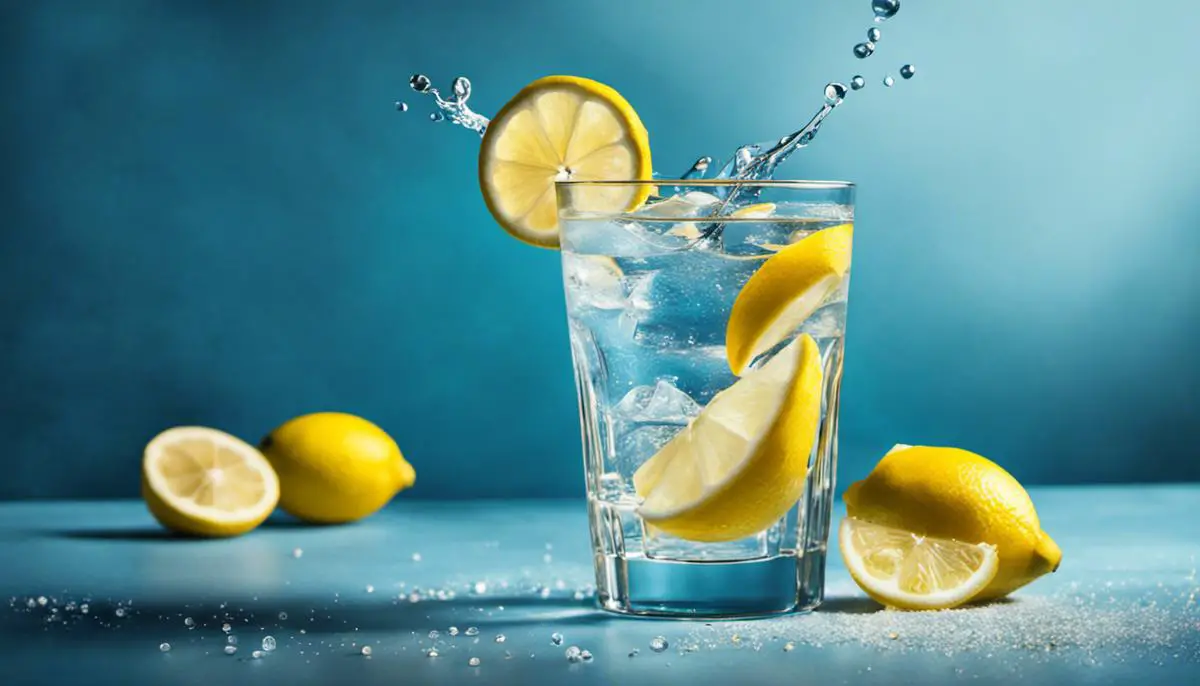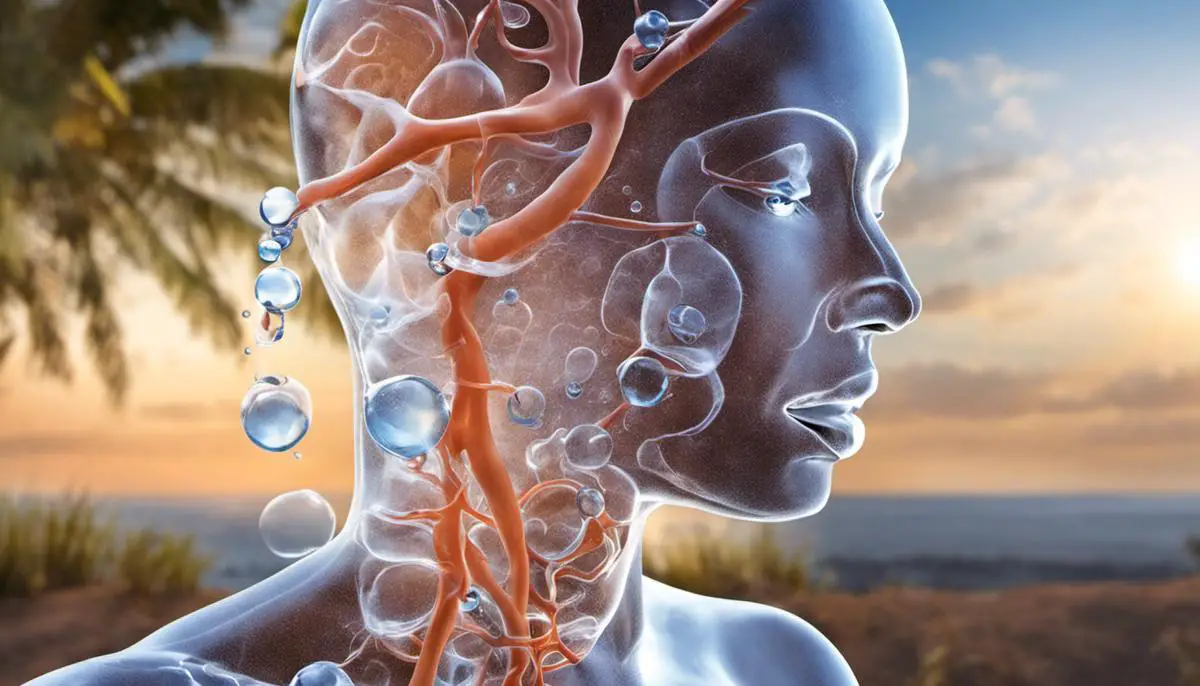The human body, comprising about 60% water, relies on this vital fluid for every metabolic process. Physiological functions like digestion, nutrient absorption, temperature regulation, and cell communication all hinge on our water intake. However, in the hustle and bustle of daily life, maintaining hydration levels can often take a backseat. When water balance is compromised, dehydration, an under-acknowledged but potentially serious condition, sets in. This write-up aims to unravel the complexities of dehydration and underscore the crucial role of water in health and wellness. Simple terms are employed while discussing scientific facts, making the information accessible and decipherable for everyone.
The Science of Dehydration
Understanding Dehydration: The Basic Science
Dehydration occurs when the body loses more fluids than it takes in, leading to an imbalance that disrupts the usual functioning of the body. At the most basic level, your body needs water to survive. Various vital bodily functions, from digestion to temperature regulation, require water to operate effectively. This is why it’s vital to replace any water losses promptly, particularly during periods of intense activity or in hot temperatures when sweating increases.
Potential Consequences of Dehydration
If water isn’t replenished, the imbalance leads to dehydration – this in turn can affect vital organs and body functions. Mild dehydration can lead to noticeable symptoms like dry mouth, fatigue, dizziness, and reduced urine output. If dehydration becomes more severe, it can have serious consequences, including heat injury, urinary and kidney problems, seizures due to electrolyte imbalance, or even shock— a life-threatening condition requiring immediate medical attention.
The Body’s Water Resorption Process
In response to dehydration, the body activates various mechanisms to conserve water and restore balance. One such mechanism is water resorption in the kidneys. The kidneys filter about 45 gallons of blood a day and, through a complex process, produce urine. If you’re dehydrated, hormones like antidiuretic hormone (ADH) and aldosterone are released, which prompt your kidneys to retain more water and excrete less in urine. This process helps preserve water in the body, but it can only go so far—a continuous lack of adequate water intake will still lead to worsening dehydration.
Dehydration and Health: The Crucial Role of Water
After understanding why dehydration occurs, it’s crucial to understand its impact on health and the importance of maintaining sufficient water intake. Regular water consumption is vital for your health. It keeps your temperature normal, lubricates and cushions joints, protects your spinal cord and other sensitive tissues, and aids in digestion.
Moreover, adequate water intake can improve various aspects of health. It boosts skin health and beauty, promotes cardiovascular health, keeps muscles and joints working better, and more. Also, staying hydrated helps the brain function optimally, enhancing cognitive function. Therefore, not only is water consumption crucial to prevent dehydration but it’s also fundamental for overall health.
How Much Water Do We Need?
The amount of water a person needs can depend on a variety of factors, like age, sex, weight, and activity level. However, a general guideline suggests drinking at least eight 8-ounce glasses of water a day, which equals about 2 liters, or half a gallon. When your water intake doesn’t equal your output, you can become dehydrated.
Understanding the importance of hydration can often be a daily ordeal. However, gaining knowledge about the pitfalls of dehydration and the numerous advantages of consuming water regularly can inspire one and all to ensure there always a water bottle nearby and remain hydrated.

Signs and Symptoms of Dehydration
What is Dehydration? A Brief Synopsis
Dehydration is a condition that develops when your body lacks the necessary water to perform its usual tasks. You lose water every day through activities like breathing, sweating, and relieving yourself. Situations in which you’re expelling more water than you’re consuming, such as during extreme physical exertion, heat exposure, or while sick, the chances of becoming dehydrated significantly heighten.
The Varied Degrees of Dehydration
Mild, moderate, and severe are the three main degrees of dehydration. Mild dehydration tends to induce feelings of thirst and a slight reduction in bodily performance. As dehydration moves on to moderate levels, the body begins to show more significant signs such as dry mouth, fatigue, and decreased urine output. Severe dehydration, a medical emergency, involves symptoms like extremely dry mouth, lack of sweating, and rapid heart rate.
Thirst vs. Dehydration: Know the Difference
Though thirst is a signal from the body to increase fluid intake, it is not always an accurate indicator of your body’s water needs. By the time you’re thirsty, you may already be slightly dehydrated. To ensure that your body has the fluids it needs, make water your beverage of choice.
The Less Known Symptoms of Dehydration
Apart from the commonly known symptoms of dehydration, there are less evident signs one needs to be aware of. These include headaches, constipation, and muscle cramps. Dehydration can also lead to mood changes, like feeling irritable or confused. In severe cases, it can lead to rapid heart rate, sunken eyes, and in very serious instances, fainting or unconsciousness.
Staying Hydrated: The Importance of Drinking Water
Drinking water is essential to a healthy lifestyle. Aside from quenching thirst, water regulates body temperature, lubricates the joints, aids in digestion, and flushes body waste. Furthermore, water plays a significant role in disease prevention, encouraging better physical performance and cognitive health.
It is recommended to drink about eight 8-ounce glasses, which equals about 2 liters, of water per day. However, the amount can vary depending on a person’s health, how active they are, and where they live. For example, pregnant women or people living in hot climatic conditions may need more than the typical eight glasses.
Early Indications of Dehydration
Good hydration is crucial for maintaining health, yet many people do not drink enough water each day. The initial signals of dehydration can serve as reminders to boost our fluid intake. Indicators such as dry mouth, unusually dark urine, tiredness, dizziness, and mental fogginess should not be overlooked.
Preemptively drinking water, before the onset of thirst, can help avoid dehydration. Following the 8-8 rule – drinking eight glasses, each containing eight ounces of fluid, daily – can provide a guide for sufficient water consumption. Keeping a water bottle handy for frequent sips can also help, especially in hot weather or during physical activity. But of course, severe dehydration symptoms require immediate medical attention.

The Role of Water in Health
Insight Into Dehydration and Its Impact on Health
Dehydration is a state of serious fluid deficit, enough to interfere with normal bodily functions, making it a significant public health concern. It is either caused by drinking too little water or losing too much through sweating, frequent urination, vomiting or diarrhea. The consequences vary substantially, with milder symptoms like thirst or dry mouth escalating to serious conditions like uncontrolled vomiting, high temperature, and accelerated breathing.
The Necessity of Water in the Body
Water plays a crucial role in maintaining overall health, serving as the primary building block of cells. It performs several crucial functions, including regulating body temperature, cushioning the joints, aiding digestion, and eliminating body waste through sweat, urine, and bowel movements. Further, it forms saliva, lubricates the eyes, and maintains the skin’s elasticity and resilience.
Impact of Hydration on Different Body Systems
Keeping the body adequately hydrated has tremendous benefits to various body systems and functions. For instance, water helps maintain the balance of bodily fluids that are responsible for digestion, absorption, transportation of nutrients, and maintenance of body temperature. Adequate hydration promotes cardiovascular health, keeping the heart functioning correctly by assisting in the transportation of oxygen and nutrients to the body’s cells.
In the kidneys, water aids in filtering waste from the blood and eliminating it in urine while preventing kidney damage. Similarly, water aids in digestion, preventing constipation and allowing the body to properly break down food to extract nutrients. Hydration also supports the body’s muscles and joints, providing essential nutrients, improving performance, and assisting in recovery from a workout or physical activity.
Hydration and Skin Health
Dehydration can make the skin look more dry and wrinkled. Proper hydration, therefore, enhances skin health and appearance. Water consumption can moisturize the skin, keep it fresh, glowing, soft, and smooth, and assist in maintaining optimum skin elasticity. It also aids in flushing out toxins, providing a more radiant complexion.
Hydration, Weight Management, and Cognitive Function
Hydration plays a vital role in weight management. Drinking water moderates hunger and boosts metabolism, assisting in weight loss. It aids in digestion, flushes out toxins and byproducts of fat breakdown, and may suppress feelings of hunger. Water, being entirely free of calories, serves as an excellent replacement for high-calorie drinks.
Proper hydration can significantly impact cognitive function. Dehydration can impair attention, motor coordination, and executive function. Regular intake of water can improve focus, short-term memory, and the overall mental performance, reducing feelings of fatigue and enhancing mood. It aids the brain in functioning, keeping the mind sharp and active.
Understanding the Importance of Proper Hydration and Drinking Water
Staying optimally hydrated is integral to good health and requires a consistent, daily approach. Drink water primarily before each meal to enhance digestion, and also replenish fluids during and after exercise to compensate for loss through perspiration. Note, it’s essential to prevent overhydration as this can lead to water toxicity or water intoxication, which can be fatal.
Common advice suggests following the “8×8 rule” which involves drinking eight, 8-ounce glasses of water each day. However, individual hydration needs can vary based on numerous factors such as age, sex, weight, physical activity level, and overall health. In addition to drinking water, you can boost your fluid intake by consuming fruits and vegetables with high water content.

Photo by brettwharton on Unsplash
Hydration Tips and Strategies
Implications of Hydration on Health: Why Water is Vital
Water is profoundly important to our health as it impacts every major bodily system. Given that about 60% of the human body is water, maintaining proper hydration aids in vital physiological functions including digestion, nutrient absorption, and body temperature regulation. Lack of adequate water in the body, or dehydration, can trigger a multitude of health issues ranging from heat stroke, kidney stones, and constipation to blood clot-related conditions such as deep vein thrombosis and pulmonary embolism.
Recommended Daily Water Intake
The National Academies of Sciences, Engineering, and Medicine recommends an average daily intake of about 3.7 liters (around 125 ounces) for men and 2.7 liters (approximately 91 ounces) for women. This includes all beverages and food. However, individual fluid needs can vary greatly depending on factors like age, physical activity, health conditions, and climate.
Ways to Make Drinking Water a Habit
Establishing and following a routine can be beneficial in meeting the recommended water intake. Some strategies include drinking one or two glasses of water after waking up, carrying a reusable water bottle, using a digital app to track intake and provide reminders, consuming water-rich foods, and alternating between water and other beverages throughout the day.
Role of Foods and Other Beverages in Hydration
Foods, particularly fruits and vegetables, are vital sources of water and can contribute to up to 20% of an individual’s total water intake. Cucumbers, tomatoes, melons, oranges, and strawberries, for instance, are more than 90% water. Additionally, beverages like herbal tea, milk, juice, and even coffee can contribute to overall hydration. However, it’s essential to note that drinks containing alcohol or large amounts of sugar can lead to dehydration.
Avoiding Overhydration
While staying hydrated is important, one should be wary of overhydration or water intoxication. It’s a condition typically a result of drinking too much water in a short amount of time, leading to a dangerous drop in electrolyte levels, specifically sodium. Symptoms include headache, nausea, muscle weakness, and in severe cases, seizures or coma. Hence, it’s essential to spread water intake evenly throughout the day and not exceed capacity.
Key Takeaway
Overall, drinking sufficient water and maintaining a balanced hydration level is crucial for overall health. It not only helps the body perform better but also facilitates necessary physiological processes.

While the importance of water might seem blatantly obvious, numbers reflecting chronic dehydration suggest that understanding doesn’t always translate into practice. Dehydration should not be taken lightly, given its far-reaching implications on physical well-being and cognitive function. Boosting your hydration levels isn’t merely about gulping down glasses of water, but about making thoughtful choices regarding the consumption of fluids, foods, and understanding your body’s unique requirements. By adopting effective hydration strategies, we can pave the way towards radiant health, bolster our defense system, and augment cognitive function, thereby improving our quality of life. Undoubtedly, water is the most valuable yet underappreciated component that fuels our existence.
